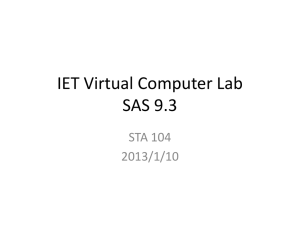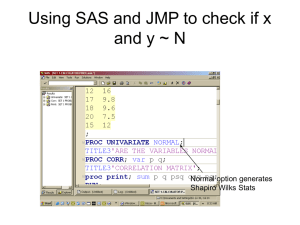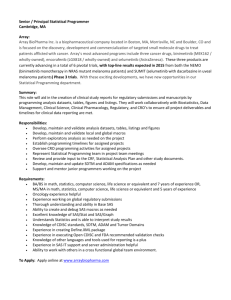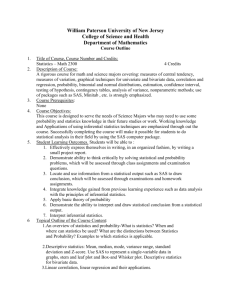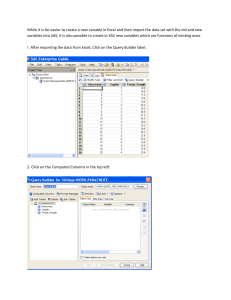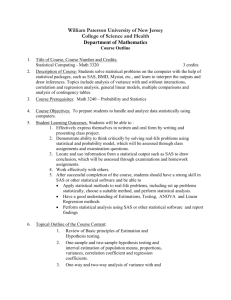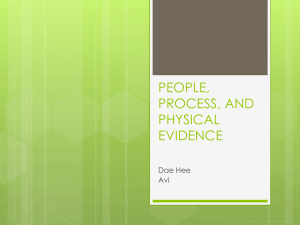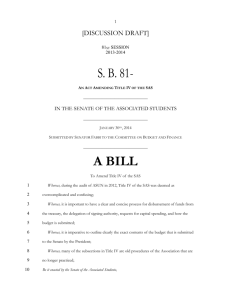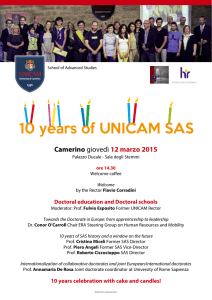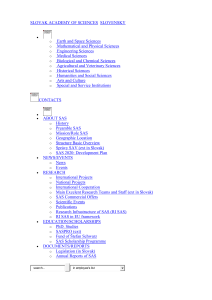Syllabus - Florida Atlantic University
advertisement
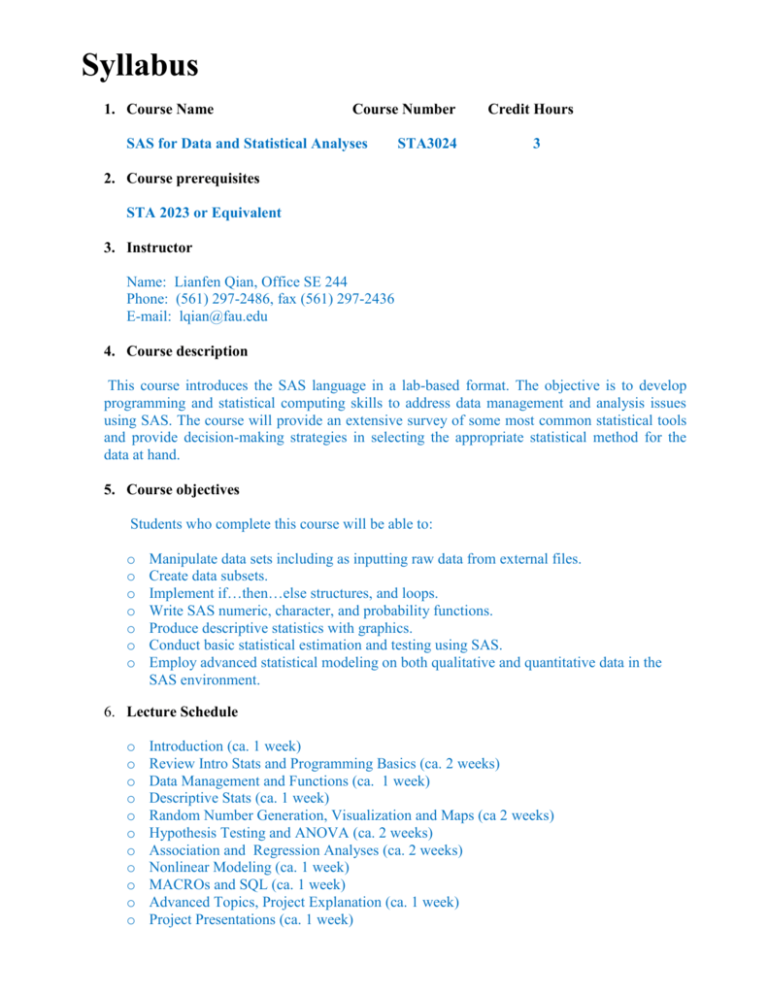
Syllabus 1. Course Name Course Number SAS for Data and Statistical Analyses STA3024 Credit Hours 3 2. Course prerequisites STA 2023 or Equivalent 3. Instructor Name: Lianfen Qian, Office SE 244 Phone: (561) 297-2486, fax (561) 297-2436 E-mail: lqian@fau.edu 4. Course description This course introduces the SAS language in a lab-based format. The objective is to develop programming and statistical computing skills to address data management and analysis issues using SAS. The course will provide an extensive survey of some most common statistical tools and provide decision-making strategies in selecting the appropriate statistical method for the data at hand. 5. Course objectives Students who complete this course will be able to: o o o o o o o Manipulate data sets including as inputting raw data from external files. Create data subsets. Implement if…then…else structures, and loops. Write SAS numeric, character, and probability functions. Produce descriptive statistics with graphics. Conduct basic statistical estimation and testing using SAS. Employ advanced statistical modeling on both qualitative and quantitative data in the SAS environment. 6. Lecture Schedule o o o o o o o o o o o Introduction (ca. 1 week) Review Intro Stats and Programming Basics (ca. 2 weeks) Data Management and Functions (ca. 1 week) Descriptive Stats (ca. 1 week) Random Number Generation, Visualization and Maps (ca 2 weeks) Hypothesis Testing and ANOVA (ca. 2 weeks) Association and Regression Analyses (ca. 2 weeks) Nonlinear Modeling (ca. 1 week) MACROs and SQL (ca. 1 week) Advanced Topics, Project Explanation (ca. 1 week) Project Presentations (ca. 1 week) 7. Required Text Elliott, R.J. (2010), Learning SAS in the Computer Lab, Third Edition, Brooks/Cole. (ISBN 0-495-55968-7) 8. Assessment Procedure and Grading There will be six take-home homework assignments accounting for 60% of your cumulative performance, four in-class quizzes accounting for 20% of your cumulative performance, and a final project that accounts for 20% of your cumulative performance. Your overall grade in the course is derived from your cumulative performance according to the following table. Cumulative Performance > 93% > 90% – 93% > 87% – 90% > 83% – 87% > 80% – 83% > 77% – 80% > 73% – 77% > 70% – 73% > 67% – 70% > 63% – 67% ≥ 60% – 63% <60% Grade A A− B+ B B− C+ C C− D+ D D− F 9. Incomplete Grades A grade of I (incomplete) will only be given under certain conditions and in accordance with the academic policies and regulations put forward in FAU’s University Catalog. The student has to show exceptional circumstances why requirements cannot bet met. A request for an incomplete grade has to be made in writing with supporting documentation, where appropriate. 10. Makeup Tests and Extra Credit If you cannot attend an exam or hand in a homework project in time due to a relevant reason like significant health problems or being involved in a major traffic accident, and you document this, then you can make up the respective assignment. 11. Method of Instruction The course is conducted in lectures combined with lab sessions. Assignments may require the use of a statistical software package SAS. 12. Disability policy statement In compliance with the Americans with Disabilities Act (ADA), students who require special accommodations due to a disability to properly execute coursework must register with the Office for Students with Disabilities (OSD) located in Boca Raton - SU 133 (561-297-3880), in Davie - 2 MOD I (954-236-1222), in Jupiter - SR 117 (561-799-8585), or at the Treasure Coast - CO 128 (772-873-3305), and follow all OSD procedures. 13. Honor Code policy statement Students at Florida Atlantic University are expected to maintain the highest ethical standards. Academic dishonesty, including cheating and plagiarism, is considered a serious breach of these ethical standards, because it interferes with the University mission to provide a high quality education in which no student enjoys an unfair advantage over any other. Academic dishonesty is also destructive of the University community, which is grounded in a system of mutual trust and places high value on personal integrity and individual responsibility. Harsh penalties are associated with academic dishonesty. For more information, see University Regulation 4.001 at http://www.fau.edu/ctl/4.001_Code_of_Academic_Integrity.pdf 3
